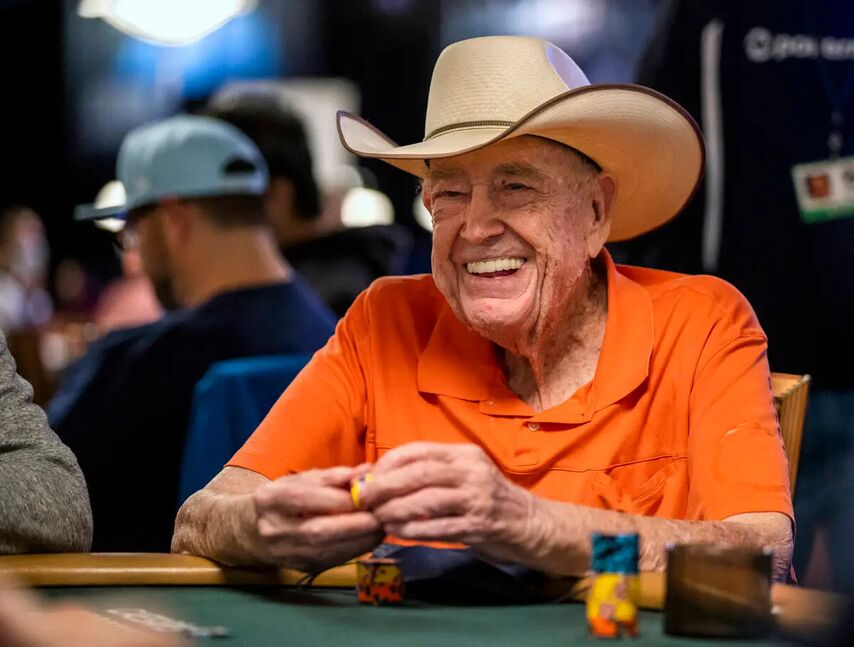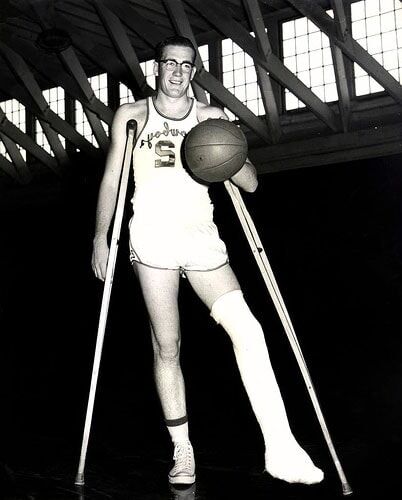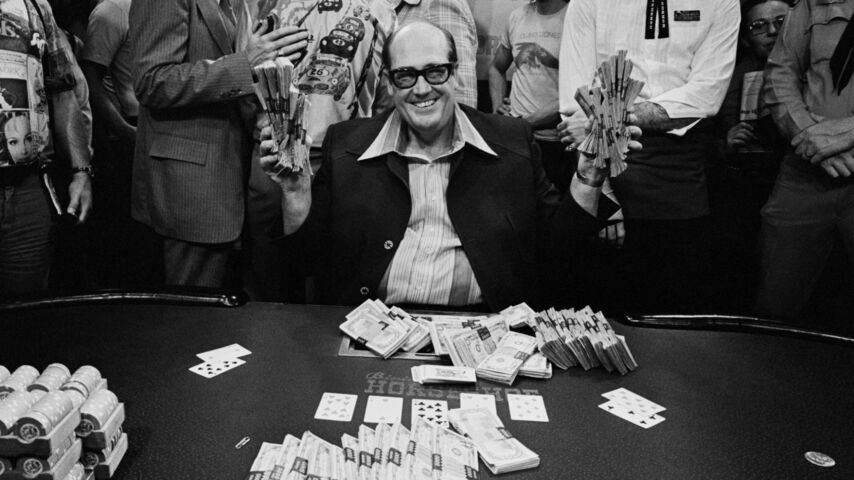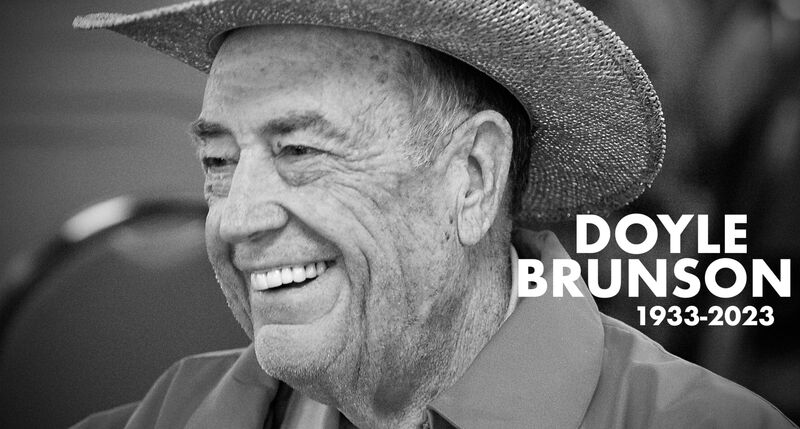In professional poker, few names are as iconic and revered as Doyle Brunson. Dubbed the "Godfather of Poker," Doyle Brunson has left an indelible mark on the game through his remarkable poker skills and enduring influence on the poker community. This comprehensive article delves into the life, illustrious poker career, books, net worth, and legacy of a man who has become a true legend of the game.

Early Life
Doyle F. Brunson was born in August of 1933 in the small town of Longworth, Texas. Brunson was a multi-talented high school athlete, thriving in basketball and track and field. Despite receiving scholarship offers from multiple universities across the United States, Brunson opted to attend Hardin-Simmons University in Texas to play basketball because it was near his hometown.
While working at a nearby gypsum factory over the summer, Brunson's knee was severely damaged when he attempted to prevent a piece of sheetrock from falling, crushing his knee. In the aftermath of his injury, Brunson displayed unwavering determination in his studies.

He completed his Bachelor's Degree in Education in 1954 and, shortly after that, earned a Master's Degree in Administrative Education. However, when he couldn't secure a teaching position immediately, he opted to work for a business machine company.
Poker Career
He didn't begin his poker journey in lavish casinos; his initial encounters with the game occurred in underground, illicit poker dens spread throughout Texas. Organized crime syndicates typically operated these games, which meant they were not subject to regulation. During the early years of his career, Doyle's life was put in danger on multiple occasions when he emerged victorious against members of these gangs.
After spending numerous years playing in illegal gambling dens, Brunson eventually made his way to Las Vegas, where he would spend the remainder of his professional poker career. He has consistently participated in the World Series of Poker, founded in 1970.

Brunson's remarkable achievement includes winning four consecutive WSOP tournaments from 1976 to 1979. Brunson has won an astounding ten WSOP bracelets in his illustrious career. Brunson even has a hand named after him. 10-2 offsuit, as it’s the hand he won both of his WSOP Main Event titles with.
| Year | Event | Winnings |
|---|---|---|
| 1976 | $5,000 Deuce to Seven Draw | $80,250 |
| 1976 | $10,000 No Limit Hold’em World Championship | $230,000 |
| 1977 | $1,000 Seven Card Stud Split | $62,500 |
| 1977 | $10,000 No Limit Hold'em World Championship | $340,000 |
| 1978 | $5,000 Seven-Card Stud | $68,000 |
| 1979 | $600 Mixed Doubles Seven Card Stud (with Starla Brodie) | $4,500 |
| 1991 | $2,500 No Limit Hold'em | $208,000 |
| 1998 | $1,500 Seven-Card Razz | $93,000 |
| 2003 | $2,000 H.O.R.S.E. | $84,080 |
| 2005 | $5,000 No Limit Shorthanded Texas Hold'em (6 players per table) | $367,800 |
Brunson’s 10 WSOP Bracelets
Super System Book
A remarkable introduction to the poker world, Doyle Brunson's Super System was published in 1979 and quickly became a sensation. The fundamental principle of the book indicates that poker is a fun game of human psychology, expounding that a deeper understanding of your opponents greatly enhances your ability to succeed.
Doyle Brunson's poker book was intended as a guide for the average poker player, assuming they already grasp poker rules, variations, and integral strategies such as bluffing, slow-playing, and improving their hand. Doyle Brunson's Super System starts from the premise that the player does not have advanced strategic skills and aims to address this lack of knowledge.

The initial part of the poker strategy guide outlines the basics of a conservative yet assertive approach, understanding the value of pot odds, and gaining insights into your opponents. Subsequent sections delve into the practical application of these principles within the poker variations that enjoyed popularity during the late 1970s.
Although many of its strategic recommendations have become outdated, the significant progress in poker theory over the past 50 years has largely supplanted the book's specific guidance. The overarching principles outlined in the book remain relevant, but its advice, particularly in the context of hold'em, has aged poorly, especially if you play exclusively online on sites like 888Poker, PokerStars, and GGPoker.
Networth
By 2023, he has amassed over $6,100,000 in live tournament winnings. Out of this, he earned over $3,000,000 through his 37 cashes at the WSOP. From the 1950s until Doyle Brunson's retirement, he participated in some of the most renowned high-stakes cash games worldwide, notably the Big Game, a continuous high-stakes mixed game regularly held at the Bellagio. It is where Doyle derived most of his poker winnings, increasing his net worth.
During the 2000s, he enjoyed sponsorship as a professional poker player for numerous online poker platforms. Subsequently, he established Doyle's room, ultimately selling it to ACR in 2011. Brunson's net worth is estimated to be around $75 million.
Death
Unfortunately, Doyle Brunson passed away, aged 89, on 14 May 2023 in Las Vegas, Nevada, United States. No official statement was issued regarding the cause of his death. Brunson's death marks the end of an era, as his remarkable career spanned decades and inspired countless players.

Legacy and Influence
Brunson was inducted into the Poker Hall of Fame in 1988. Doyle Brunson's legacy in the world of poker is immeasurable. His contributions to the game, in terms of strategy and personality, have left an indelible mark. As we reflect on the life and career of Doyle Brunson, it becomes evident that he embodies the essence of poker itself—resilience, adaptability, and the pursuit of excellence. His enduring legacy will continue to inspire poker players and enthusiasts for generations. Doyle Brunson is not just a legend of poker; he embodies the game's spirit, and his name will forever be synonymous with the world of high-stakes poker.




















